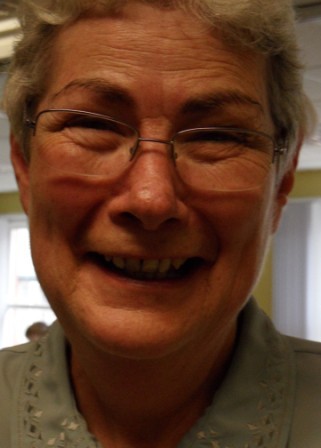Ruth Grayson is the founder of CASC-aid a campaign working against the secularisation of Christmas, and for an increase in charitable giving. We spent a fascinating afternoon hearing from her about what she is trying to do, and were challenged and inspired by her counter-cultural and compassionate message we believe its one that needs to be heard. In part one of this guest blog, Ruth tells us about her own journey with Christmas…

“My husband and I spent seven years in South Korea working as missionaries with the United Methodist Church USA back in the 1980s and it was during this time, that my passion for the real meaning of Christmas started.
“While we were there, I actually hated their version of Christmas! Partly I missed my family back home, but also I didnt like the lack of build-up to it. South Korea isnt a Christian country (although around twenty five per cent of the population are Christians), so although Christmas Day is a bank holiday, not much happens for it, its really just a day off, and then everyone goes back to work the next day.
“So when we came back to live in the UK, it was quite a different experience to see how commercialised Christmas had become here it was a stark contrast.
“To begin with, I actually really enjoyed it I got involved in everything that happened in the lead-up, and loved singing familiar carols again and going to all the Christmas services with my family. But as the children grew older, other pressures started to crowd in particularly around the amount of money spent on gifts, and on the stress of preparations.
I began to get worried that my favourite day was actually Boxing Day, because I could finally put my feet up and take it easy!
I wondered what that said about my faith and why it was that the day after we celebrate Jesus coming, we shut up shop and say its all over. After all, Christmas is about God coming and dwelling with us staying with us.
I also worried about how much people were spending.
So, my family decided to start doing things a bit differently. We started putting IOU notes under the tree for each other, and then went shopping together in the Boxing Day sales. We also gave the money we had saved from spending less to charity.
Christmas Day started to feel like it was about what it should be again celebrating Jesus birth, going to church, and being with family. It took away the pre-Christmas stress of running round buying presents, and meant our charitable giving increased.
I should mention that we still had stockings you have to have some nonsense still!
But it got me thinking… I started to do some writing about how churches were starting to jump on the band-wagon of the commercialisation of Christmas how they were all so busy in the run-up to Christmas Day, and then after the Christmas Day service, locked the door, often until the New Year.
And I began to talk about what churches could do before Christmas to take the pressure off, especially off ministers who often end up on their knees. What if we started to transfer some things to that period between Christmas and Epiphany? Then perhaps we could continue the celebration of the Christmas period, rather than it all being concluded on one day. After all, Epiphany is a celebration of Jesus being recognised by the gentiles its about the message of the Gospel spreading around the world.
So I did things like writing pantomimes for our church and this worked well. We found it gave children fun things to focus on rather than just feeling gloomy about the holidays being over and going back to school.
I also started to get more pre-occupied with the gift-giving aspect of Christmas. I discovered that the origin for giving gifts to individuals comes from the pagan aspects of 25 December and specifically from the Roman festival of Saturnalia, which Christmas was meant to replace.
But in scripture, gifts are given to the baby Jesus (i.e. to God ) and John the Baptist preached that people should share their possessions to the poor as preparation for the Messiah coming.
From this, I began to think about an idea of 50:50 giving at Christmas i.e. giving as much as we spend on ourselves.
Meanwhile, I was also spending a lot of time researching social and economic history in my work in Sheffield, and then focusing specifically on employment issues. Ive also been involved in setting up various projects locally for the unemployed and homeless on a voluntary basis. So out of these things, I made a further realisation.
Christmas puts so much pressure on people. Its the greatest single cause of personal debt in the UK, a major cause of relationship breakdown, a key factor in mental illness, and one of the main causes of severe stress in the UK and USA – and that sticks in my throat as a Christian.
Christmas is for celebrating Christs birth so surely the church shouldnt be sitting back and letting this all happen in the name of Christianity?
So CASC-aid started to evolve out of all this a desire to alleviate stress and debt; and a vision of getting back to the real meaning of Christmas where we have time to celebrate God with us, and our giving is focused beyond ourselves.
(Look out for part two of this guest blog, coming tomorrow, where Ruth explains her vision for CASC-aid, and Christmas itself in this country, and tells us how we could get involved.)